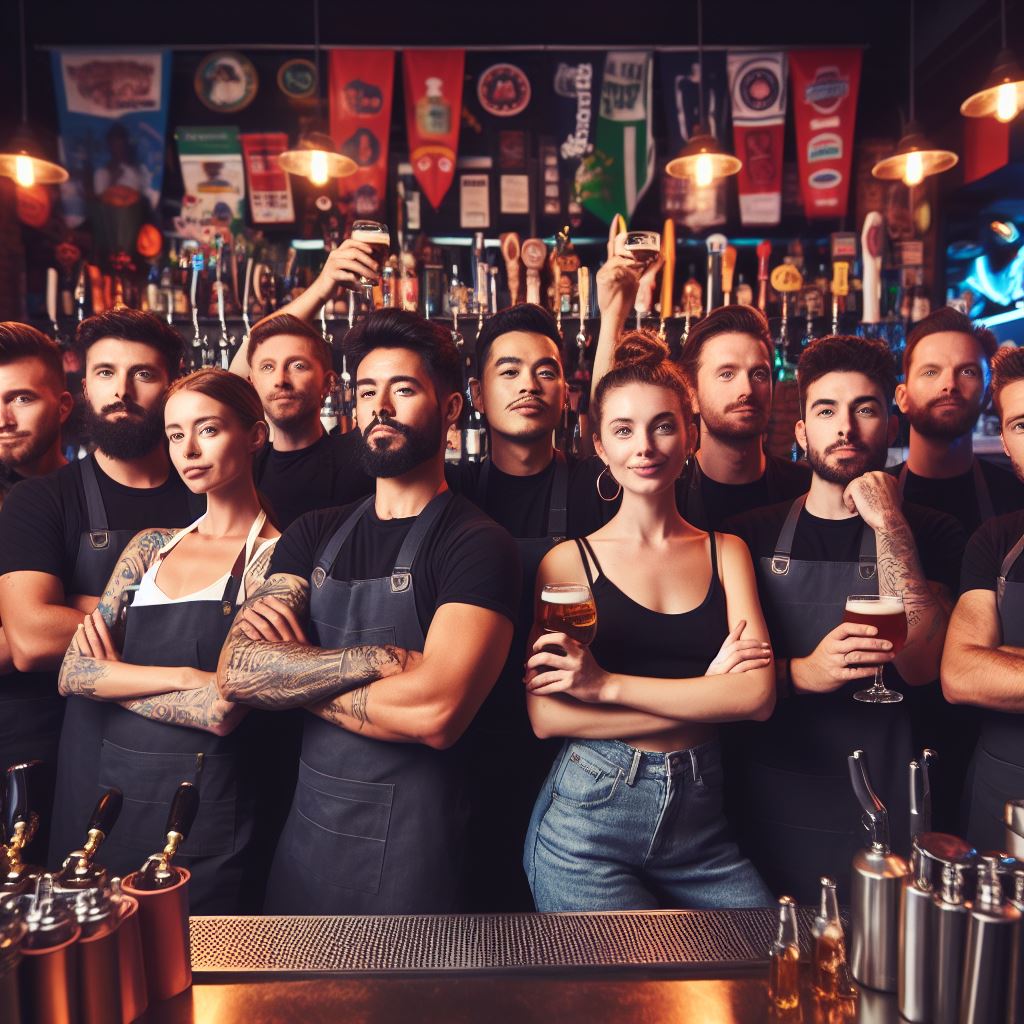Introduction
Explore the earning potential of bartenders in the US, considering factors like tips, location, and experience to understand income variations.
A. Definition and role of bartenders
Bartenders are professionals who mix and serve alcoholic and non-alcoholic beverages to customers in bars, restaurants, and other establishments.
They play a crucial role in creating a positive and enjoyable bar experience for patrons.
B. Overview of the earning potential of bartenders
Being a bartender can be financially rewarding, especially for those who excel in their craft and work at popular establishments.
Bartenders have the opportunity to earn both a base wage and additional income through tips.
The earning potential of bartenders varies depending on various factors such as location, experience, and the establishment they work in.
Bartenders in upscale bars and restaurants located in major cities tend to earn more than those working in smaller towns or less prestigious venues.
In addition to their base wage, bartenders rely heavily on tips to boost their earnings.
Tip amounts can vary greatly, but on average, bartenders can earn 15-20% of the total sales they generate in tips.
Exceptional bartenders who provide excellent service and create a welcoming atmosphere can even earn higher tips.
Moreover, bartenders who gain experience and build a loyal customer base can negotiate higher wages or find higher-paying job opportunities.
Some bartenders also participate in bartending competitions or take on consulting gigs, which can further increase their earning potential.
Overall, the earning potential of bartenders can range from modest to lucrative, depending on the factors mentioned above.
Hard work, skill development, and professionalism play significant roles in maximizing their earning potential in this profession.
Factors that Affect Earnings
A. Location and demand
Location plays a vital role in determining a bartender’s earning potential in the US.
Bartenders working in big cities often earn more than those in small towns due to higher demand and increased competition.
Additionally, establishments located in tourist hotspots usually have higher customer turnover, leading to better tip opportunities for bartenders.
B. Type of establishment
The type of establishment where a bartender works can significantly impact their earnings.
High-end bars, popular nightclubs, and upscale restaurants usually attract more affluent customers who are willing to spend more on drinks and offer generous tips.
Hence, bartenders in these establishments tend to earn higher incomes.
Transform Your Career Today
Unlock a personalized career strategy that drives real results. Get tailored advice and a roadmap designed just for you.
Start NowC. Experience and skills
Bartenders with extensive experience and exceptional skills have better earning potential than those who are just starting their career.
Experienced bartenders often earn more due to their ability to handle high-pressure situations, create inventive cocktails, and provide exceptional customer service.
Moreover, certifications such as mixology and flair bartending can increase their market value and earning potential.
In general, several factors influence the earning potential of bartenders in the US. Location and demand, the type of establishment, and experience and skills all play crucial roles in determining a bartender’s income.
By considering these factors, aspiring bartenders can make informed decisions to maximize their earning potential in this dynamic industry.
Read: Bartender Licensing: State-by-State Guide in the US
Average Salaries of Bartenders
A. National average salary
According to the Bureau of Labor Statistics, the national average salary for bartenders is $26,780 per year.
B. Variations in salaries based on location
The earning potential of bartenders varies significantly depending on the location they work in.
- In cities with a high cost of living and vibrant nightlife scenes, such as New York and San Francisco, bartenders can earn higher salaries.
- In rural areas or small towns, where the demand for bartenders may be lower, salaries tend to be lower.
C. Differences in salaries between types of establishments
The type of establishment a bartender works in also plays a role in determining their salary.
- Bartenders working in upscale cocktail bars or high-end restaurants may earn more due to the higher prices of the drinks they serve and the expectation of exceptional customer service.
- In comparison, bartenders in casual bars or neighborhood pubs may earn less because the prices of the drinks and the atmosphere are generally more affordable.
- Bartenders working in nightclubs or busy bars may have the potential to earn more through tips, as these establishments attract larger crowds.
It’s important to note that while the national average salary provides a general idea of what bartenders earn, individual salaries can deviate significantly from this figure.
Various factors such as experience, skills, reputation, and networking can also impact a bartender’s earning potential.
To maximize their earning potential, bartenders can take several steps:
- Obtaining professional certifications and attending bartending courses to enhance their skills and knowledge.
- Building a strong network within the industry by attending industry events and creating connections with influential individuals.
- Gaining experience in different types of establishments and locations to broaden their expertise and attract higher-paying job opportunities.
- Providing excellent customer service and developing a strong personal brand to increase their chances of being recommended and receiving larger tips.
- Being adaptable and staying up to date with industry trends, new cocktail recipes, and customer preferences to cater to evolving demands.
Generally, the average salaries of bartenders in the United States vary depending on factors such as location and the type of establishment they work in.
While the national average salary provides a baseline, individual salaries can be higher or lower based on various factors.
By continuously improving their skills, networking, and adapting to industry trends, bartenders can increase their earning potential.
Read: Key Skills Every American Bartender Should Master
Tips and Additional Income
A. Importance of tips in the bartending industry
Bartending is a profession where tips play a significant role in the overall earnings.
While the base salary may be modest, bartenders have the potential to earn a substantial amount through tips alone.
Tips reflect the quality of service provided and directly impact a bartender’s income.
B. Strategies to increase tips
- Provide exceptional customer service: A friendly and attentive bartender will create a positive experience, leading to higher tips.
- Master the art of mixology: Developing and showcasing impressive cocktail-making skills can impress customers and encourage higher tips.
- Build rapport with customers: Engaging in friendly conversations and making customers feel valued can lead to more generous tips.
- Create a welcoming atmosphere: By maintaining a clean and inviting bar area, customers are more likely to stay longer and tip better.
- Upselling techniques: Recommending premium spirits or suggesting additional items can increase the total bill, resulting in higher tips.
- Learn from experienced bartenders: Collaborating with seasoned professionals can provide valuable insights and strategies to maximize tips.
C. Additional income opportunities outside of the base salary
- Freelance bartending events: Bartenders can offer their services for private parties, weddings, and other special events, earning extra income.
- Mobile bartending: Some bartenders have successfully established their mobile bar services, catering to various functions and increasing their earnings.
- Cocktail competitions: Participating in competitions can not only showcase bartending skills but also provide additional income through cash prizes.
- Brand ambassadorship: Bartenders can promote specific liquor brands and receive compensation, either through sponsorships or endorsement deals.
- Beverage consulting: Offering expertise to bars and restaurants in menu development and mixology training can be a lucrative source of income.
- Bar ownership or partnership: As experienced bartenders, some individuals decide to open their establishments or venture into partnerships, expanding their earning potential.
Basically, tips are crucial in the bartending industry, allowing bartenders to supplement their base salary significantly.
By implementing strategies to increase tips and exploring additional income opportunities, bartenders can enhance their overall earning potential.
Transform Your Career Today
Unlock a personalized career strategy that drives real results. Get tailored advice and a roadmap designed just for you.
Start NowRemember, exceptional customer service, impressive mixology skills, and a welcoming atmosphere are essential for maximizing tips.
Additionally, freelance bartending, mobile bartending, and opportunities such as cocktail competitions and brand ambassadorship can provide bartenders with extra income.
With dedication, skill, and creativity, bartenders can unlock their full earning potential beyond the bar counter.
Read: How Holidays Affect a Waiter‘s Paycheck in the USA

Explore Further: Event Planner Salary: What You Can Expect to Earn
Uncover the Details: Pest Control Worker: Job Satisfaction and Challenges
Advancement and Career Growth
A. Opportunities for career advancement in bartending
- Bartending offers a range of opportunities for career growth and advancement.
- Experienced bartenders can move up to become head bartenders or bar managers.
- With time and dedication, bartenders can even open their own bars or move into consulting roles.
- Many bartending schools and programs also offer advanced courses for those looking to specialize.
- These courses can include cocktail development, mixology, and spirits certification.
B. Higher-paying positions in the industry
- As bartenders gain more experience and skills, they become eligible for higher-paying positions.
- Head bartenders, also known as lead bartenders, usually earn more than regular bartenders.
- They are responsible for overseeing the bar and managing other staff members.
- Bartenders who work in high-end establishments or popular nightlife destinations also tend to earn more.
- These establishments often attract a wealthier clientele who are willing to spend more on drinks.
C. Importance of networking and gaining experience
- Networking plays a crucial role in the advancement and career growth of bartenders.
- Building connections with industry professionals and fellow bartenders can lead to new opportunities.
- Attending industry events and competitions can also help bartenders gain recognition and exposure.
- Gaining experience in different types of bars and establishments is highly beneficial.
- Working in diverse settings allows bartenders to learn new techniques and expand their knowledge.
- It also exposes them to different customer preferences and helps them develop a versatile skill set.
All in all, bartending offers numerous opportunities for career advancement and growth.
Experienced bartenders can progress to higher-paying positions such as head bartenders or bar managers.
They may even have the chance to open their own bars or pursue consulting roles.
Networking, attending industry events, and gaining experience in diverse settings are important steps towards advancement.
By continuously improving their skills and knowledge, bartenders can unlock new career opportunities and increase their earning potential.
Read: History of Bartending in the USA: From Saloons to Pubs
Challenges and Potential Drawbacks
A career as a bartender in the United States may seem glamorous and exciting, but it comes with its fair share of challenges and potential drawbacks.
Let’s explore some of these challenges
A. Unpredictable working hours
- Bartenders often have to work late nights, weekends, and holidays, which can disrupt their personal lives and social commitments.
- The irregular work schedule can also lead to sleep deprivation and a lack of work-life balance.
- Managing personal relationships and finding time for self-care can become quite challenging.
B. Physical and mental demands of the job
- Bartending requires long periods of standing, often in fast-paced environments.
- Dealing with rowdy customers and diffusing tense situations can be mentally exhausting.
- Remaining alert and focused during busy shifts can take a toll on a bartender’s physical and mental well-being.
C. High competition in popular locations
- In popular tourist destinations or metropolitan areas, the competition among bartenders can be intense.
- Bartenders in these locations often face stiff competition for desirable positions and higher-paying opportunities.
- Building a reputation and gaining regular customers can be challenging amidst the abundance of talented bartenders.
Despite these challenges, there are strategies and approaches that bartenders can adopt to overcome them and thrive in their career:
1. Establishing a consistent routine
While flexibility is inherent in the hospitality industry, establishing a routine can help bartenders manage their working hours more effectively.
Creating a schedule that includes personal time for rest, relaxation, and social activities can improve work-life balance.
2. Prioritizing self-care
Bartending can be physically demanding, so it’s essential for bartenders to take care of themselves.
Eating well, staying hydrated, exercising regularly, and getting enough sleep can enhance physical and mental well-being.
3. Developing excellent customer service skills
Providing exceptional customer service can significantly impact a bartender’s success in a competitive environment.
Transform Your Career Today
Unlock a personalized career strategy that drives real results. Get tailored advice and a roadmap designed just for you.
Start NowGreeting customers warmly, remembering their preferences, and creating a pleasant atmosphere can help build a loyal customer base.
4. Networking and continuous learning
Building professional connections within the industry can open doors to new opportunities.
Attending industry events, workshops, and conferences can help bartenders stay updated with the latest trends and techniques.
5. Specializing in a niche
In highly competitive locations, bartenders can stand out by specializing in certain types of drinks or mixology techniques.
Becoming an expert in craft cocktails, wine, or spirits can attract a specific clientele and enhance earning potential.
In a nutshell, while a career as a bartender in the US offers its fair share of challenges and potential drawbacks, with the right approach and strategies, bartenders can navigate these obstacles and find success in their profession.
Uncover the Details: Craft Cocktails: America‘s Influence on Global Drinking Trends
Conclusion
A. Recap of the earning potential of bartenders in the US
Throughout this blog section, we have explored the earning potential of bartenders in the US.
We have seen that while the wages may vary depending on factors such as location and experience, bartenders have the opportunity to earn a decent income.
Tips, which can make up a significant portion of their earnings, are influenced by factors such as customer service, skill level, and the establishment they work in.
B. Encouragement for those interested in pursuing a career as a bartender
For those who are passionate about mixology and enjoy working in a lively environment, pursuing a career as a bartender can be a rewarding choice.
Not only can they earn a good income, but they also have the chance to meet new people, showcase their creativity, and continually learn and develop their skills.
With the right dedication and training, the earning potential can even increase over time.
C. Final thoughts on the topic
The earning potential of bartenders in the US is promising.
While it requires hard work, skill, and customer service, bartending can provide a stable income and a dynamic career.
For individuals who have a passion for bartending, this profession offers a wide range of opportunities and the potential for long-term growth.
So, if you aspire to become a bartender, don’t hesitate and embark on this exciting journey. Cheers to a successful bartending career!
[E-Books for Sale]
The Big Book of 500 High-Paying Jobs in America: Unlock Your Earning Potential
$19.99 • 500 High-Paying Jobs • 330 pages
Explore 500 high-paying jobs in America and learn how to boost your career, earn more, and achieve success!
See All 500 High-Paying Jobs of this E-Book
1001 Professions Without a Degree: High-Paying American Jobs You Can Start Now
$19.99 • 1001 Professions Without a Degree • 174 pages
Discover 1001 high-paying jobs without a degree! Unlock career tips, skills, and success strategies for just $19.99!




